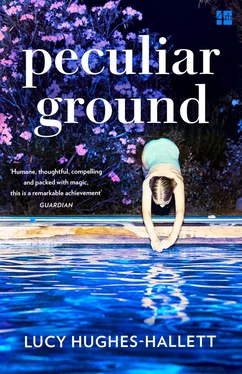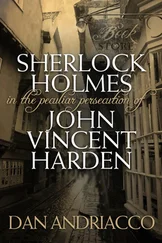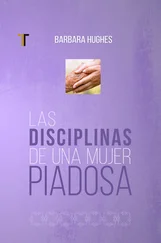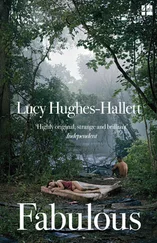The children and their sire had only just righted themselves, and begun to shake off the straw tangling in their hair, when half a dozen riders trotted into the yard. Lord Woldingham turned from his little human monkeys and stood a-tiptoe, until his wife was lifted down from the back of a dappled grey. My Lady is scarce taller than the eldest boy, very pale and small-featured. He could have picked her up and swung her in the air, as he had done to the children, but he was now all decorum. He bowed so gracefully that one hardly noticed the absence of plumed hat from hand, or buckled shoe from foot. I could not see the lady’s face clear, but it seemed to me she made no reference, by smile or frown, to his scandalous appearance, but simply held out a hand, with sweet gravity, for him to kiss.
*
I walked out after breakfast with Mr Rose, at his request, to prospect for a suitable site for an ice-house. In Italy, he tells me, the nobility build such houses, in shape like a columbarium, for the preservation of food.
A broad round hole is made in the ground. It is lined with brick and mortared to make it watertight, and a dome built over it with but a narrow entranceway, so that it looks to a passerby like a stone bubble exhaled by some subterranean ogre. The chamber is filled to ground-level with blocks of ice brought from the mountains in covered carts insulated with straw. Even in the fiery Italian summers, says Rose, the ice is preserved from melting by its own coldness. So the exquisites of Tuscany can enjoy chilled syrups all summer long. Better still, shelves and niches are made all around the interior walls of the dome, and there food can be kept as fresh as in the frostiest winter.
I was inclined to scoff at the notion. We are not Italian. We have neither mountain ranges roofed with snow, nor summers so sultry that a north-facing larder will not suffice to keep our food wholesome. Mr Rose took no offence, saying jovially, ‘Come, Norris. The air is sweet and my poor lungs crave a respite from plaster-dust. You will wish to ensure my stone beehive is not so placed as to ruin one of your fine views.’
He plays me adroitly. At the mention of a vista I was all attention. My mind running away with me, as it has a propensity to do, in pursuit of a curious likeness, I was picturing his half-moon of a building, rising pleasantly from amidst shrubs as a baby’s crown emerges from the flesh of its dam. Or I would perhaps surround it with cypresses, I thought, if they could be persuaded to thrive so far north. Then this humble food-store could make a show as pleasing as the ancient tombs surviving amidst greenery upon the Roman campagna .
(I let that last sentence stand, but note here, in my own reproof, that I have not seen the campagna , or any of Italy. I must guard myself from the folly of those who seek to appear cosmopolitan by alluding to sights of which they have but second-hand knowledge. The Roman campagna is to me an engraving, seen once only, and a fine painting in the drawing room here, whose representation of the landscape is doubtless as questionable as its account of its inhabitants. If the picture were to be believed, these go naked, and many of them are hoofed like goats.)
Mr Armstrong found the two of us around midday. He rapidly grasped the little building’s usefulness for the storage of meat and, accustomed as he is to lording it over his underlings, began to give Mr Rose orders as to where he should place hooks for the suspension of deer carcasses or pairs of rabbits. ‘Once you’ve made us that round house, Mr Rose,’ he said, with the solemnity of a monarch conferring a knighthood, ‘we’ll eat hearty all year.’
He kept rubbing his hands together. It is his peculiar way of expressing pleasure. I have seen him do it when the two fowl – the Adam and Eve of his race of pheasants – arrived safely in their hamper after traversing the country on mule-back. Already his inner ear hears the rattling of wing-feathers and the crack of musket shot. He fought for the King. The scar that traces a line from near his cheekbone, over jaw and down into his neck, tells how he suffered for it. It is curious how those who have been soldiers seek out the smell of gunpowder in time of peace. Most of the keenest sportsmen I know have experience of battle.
‘Have you anything in your pocket worth the showing?’ asked Rose. The question seemed impertinent, but Armstrong gave an equine grin. His back teeth are all gone, but those in front, growing long and yellow, make his smile dramatic. He reached into the pouch, from which he had already drawn a pocket-knife and a yard-cord for measuring, and, opening his palm flat, showed three small black coins. It came to me that it was for the sake of this moment that he had sought out our company. Rose took one up daintily, holding it by its edges as though it were a drawing he feared to smudge. ‘Trajan,’ he said, ‘Traianus,’ and he sounded as happy as I might be on finding a rare orchid in the wood. ‘Silver.’ He and Armstrong beamed at each other, then both at once remembered their manners and turned to me.
‘Mr Norris,’ it was Armstrong who spoke first. ‘If you can give us more of your time, we’ll show you what lies beyond those lakes of yours.’
‘Yes, come,’ said Rose. ‘We have been much at fault in not letting you sooner into our secret. Mr Armstrong and I are by way of being antiquaries.’
The two of them led me at a spanking pace down to the marshy low ground where the last of the lakes will spread and uphill again through bushes until we were on the slope opposing the house, and standing on a curiously humped plateau raised up above the mire.
It was as though I had been given new eyes. I had been in this spot before, but had seen nothing. This mass of ivy was not the clothing of a dead tree, but of an archway, still partially erect. Those heaps of stone were not scattered by some natural upheaval. They are the remains of a kind of cloister, or courtyard. This smoothness was not created by the seeping of water. Armstrong and Rose together took hold of a mass of moss and rolled it back, as though it were a feather-bed, and there beneath was Bacchus, his leopard-skin slipping off plump effeminate shoulders, a bunch of blockish grapes grasped in hand, all done in chips of coloured stone.
We were on our hands and knees, examining the ancient marvel, when we were interrupted.
‘Oh Mr Rose, shame on you for forestalling our pleasure! I have been anticipating the moment of revelation this fortnight.’ Lord Woldingham was there, and others were riding up behind him. Servants walked alongside a cart. There were baskets, and flagons, and, perched alongside them, three boys and a little moppet of a girl – Lord Woldingham’s offspring and the boy I had seen at Wood Manor.
‘Here are ladies come to see our antiquities. And here are scholars to enlighten us as to their history.’ Lord Woldingham was darting amongst the horses. As soon as the groom had lifted one of the ladies down, he would be there to bow and flutter and lead her to the expanse of grass where I was standing, the best vantage point for viewing the mosaic. I would have withdrawn, but Cecily Rivers detained me. It is as gratifying as it is bewildering to me to note that she seeks out my company. I am accustomed to being treated here as one scarcely visible, but her eyes fly to my face.
‘So Mr Norris,’ she said, ‘you have discovered our heathen idol? I told you this valley had supernatural protection.’
‘You spoke of fairies, not of Olympians.’
‘Do you not think they might be one and the same? Our one, true and self-avowedly jealous God obliges all the other little godlings to consort together. Puck and Pan are mightily similar. And this gentleman, with his vines and his teasel, is he not an ancient rendering of Jack in the Green?’
Читать дальше











